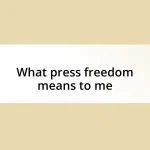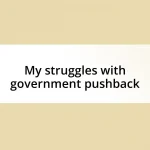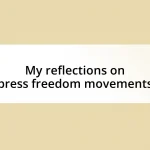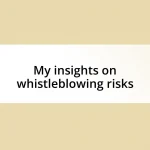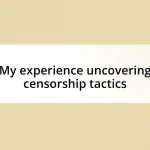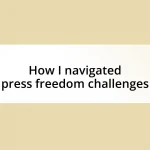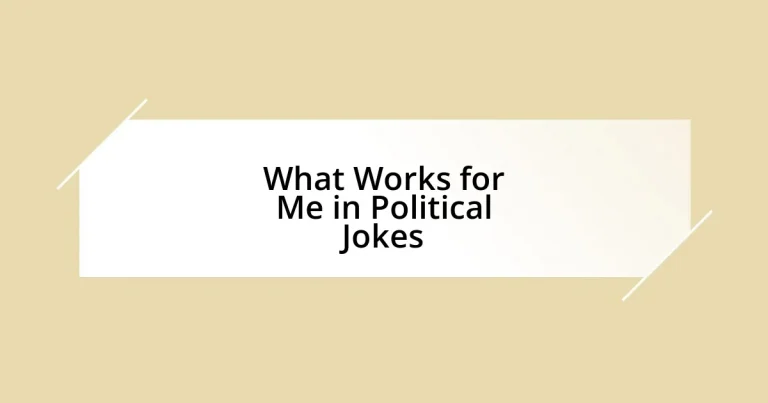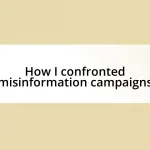Key takeaways:
- Political humor acts as a coping mechanism, allowing people to bond over frustrations while lightening the mood during overwhelming news cycles.
- Different types of political jokes—satire, parody, and one-liners—each serve distinct purposes, from provoking thought to creating relatable moments.
- Cultural context is crucial; humor can fall flat if it doesn’t resonate with the audience’s backgrounds and experiences.
- Effective timing and delivery techniques enhance the impact of jokes, making shared moments of humor more memorable and engaging.
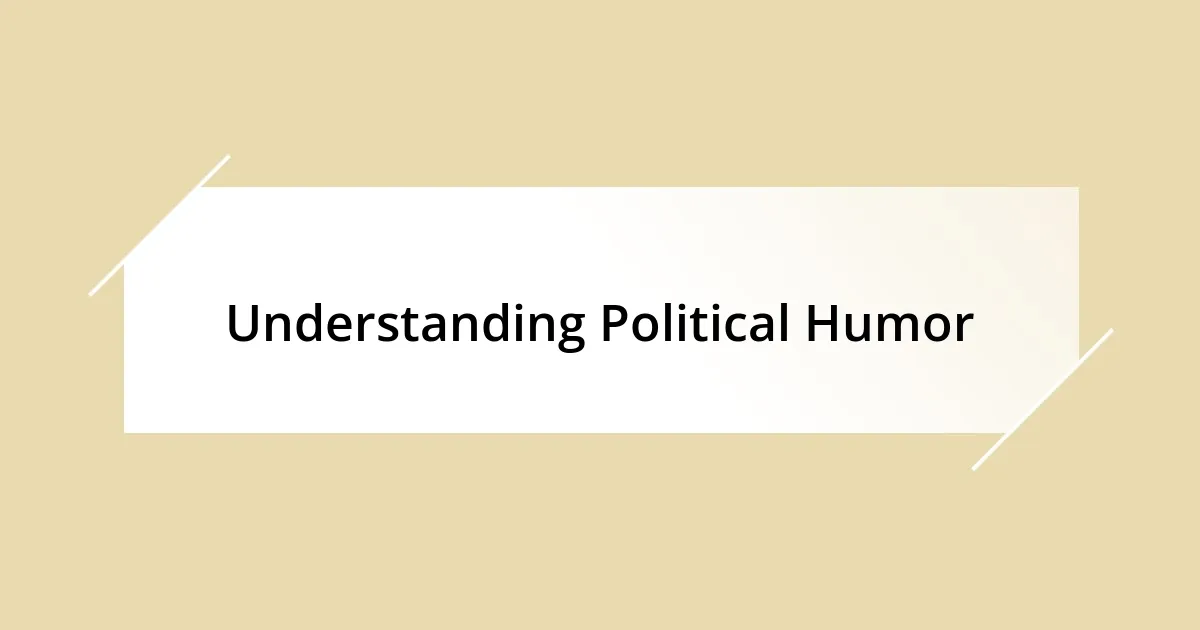
Understanding Political Humor
Political humor can be a double-edged sword; it often reflects the complexities of our beliefs and societal issues. I remember a time when a friend shared a satirical cartoon poking fun at a local politician. It sparked a lively discussion that revealed how deeply we relate to political events, even when we laugh about them. Isn’t it fascinating how a simple joke can capture the heart of a political debate?
What I find intriguing about political humor is how it serves as a coping mechanism. When the news feels overwhelming, a clever quip can lighten the mood. I often turn to late-night comedians for a dose of satire after a long day of political news. It’s like a shared collective sigh, allowing us to bond over our frustrations while chuckling at the absurdities of the political landscape.
Another aspect to consider is timing; a well-timed joke can elevate its impact significantly. I’ve noticed that some of the best political humor arises during heavy political events, like election season. Everyone seems more attuned to the absurdities, and laughter becomes a tool to dissect complicated issues. Have you ever experienced that moment where a joke hits just right, making you rethink your stance about a topic? It’s those poignant moments that remind us why political humor is both powerful and relevant.
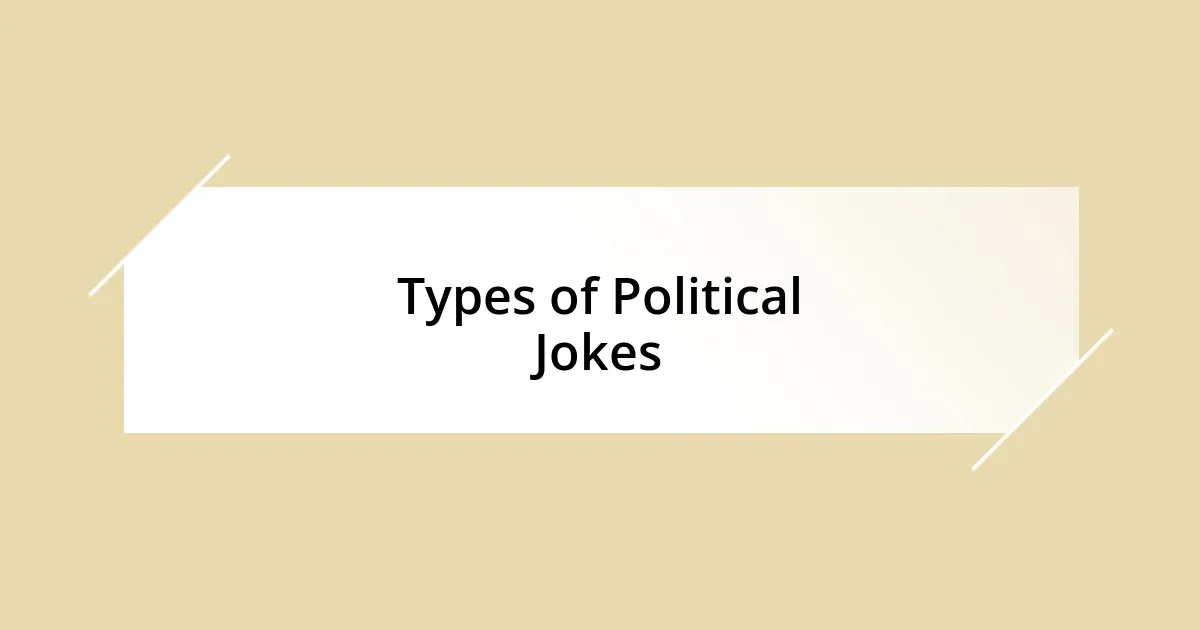
Types of Political Jokes
Political jokes come in various forms, each with its own unique flavor and style. One type I often enjoy is satire, which uses wit to criticize and expose political issues. I recall a sharp satire on social media that turned a mundane piece of legislation into a hilarious commentary on governmental red tape. The beauty of satire lies in its ability to provoke thought while simultaneously making us laugh.
Then there are parody jokes, which mimic a politician’s speech or behavior, amplifying absurdities for comedic effect. I once stumbled upon a hilarious parody that imitated how a certain politician would respond to difficult questions. It not only made me laugh out loud but also highlighted the politician’s frequent evasions. This type of humor often feels relatable, reminding us that even those in power aren’t above a good joke at their expense.
Lastly, we have one-liners, which are short, punchy jokes that leave a lasting impression. I remember hearing a one-liner at a party that succinctly summarized a chaotic political event, and the room erupted in laughter. These jokes, often easy to share, can quickly become inside jokes within a group, creating a sense of camaraderie. They exemplify how humor transcends complexity, making politics feel just a bit lighter.
| Type of Joke | Description |
|---|---|
| Satire | Uses humor to critique politics and uncover deeper truths. |
| Parody | Mimics political figures or situations to highlight absurdities. |
| One-liners | Short, witty remarks that deliver a quick punch. |
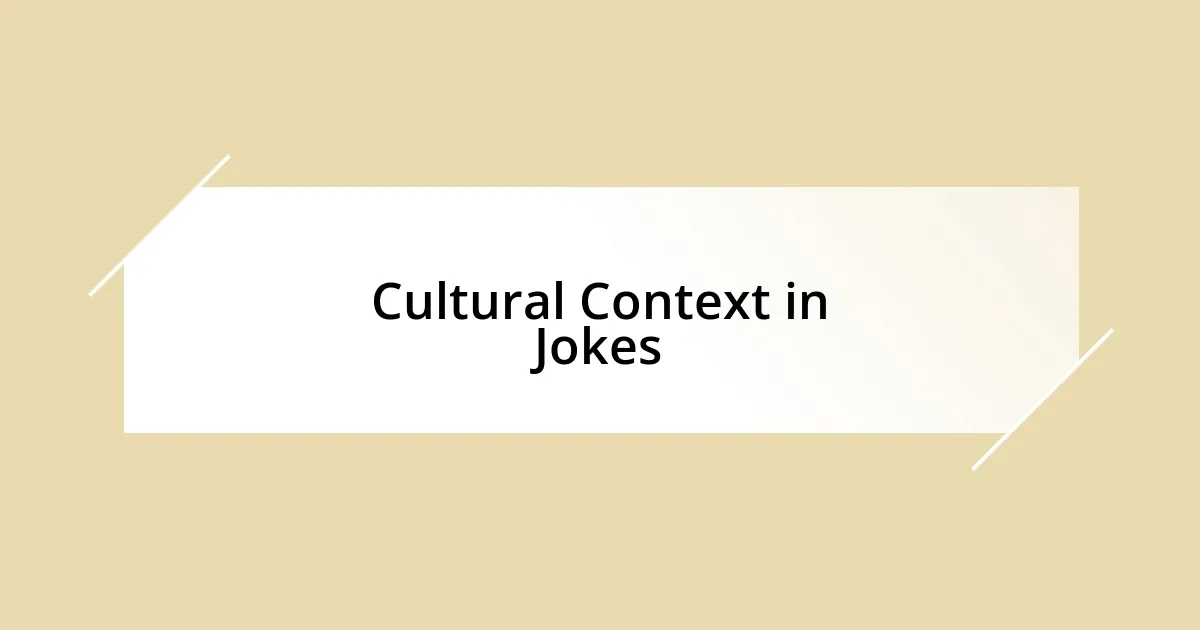
Cultural Context in Jokes
Cultural context plays a vital role in shaping political jokes. I’ve learned that jokes can sometimes miss the mark if they don’t align with the audience’s cultural background. For instance, I once shared a political joke at a family gathering, only to realize that my cousin, who had just moved from another country, didn’t find it funny. It sent me thinking about how deeply rooted traditions, values, and even past experiences influence what we find humorous. Humor is often a reflection of our shared realities, and when that context is not considered, the joke can fall flat.
- Different cultures have varying taboos and limits, which can influence the appropriateness of political humor.
- References to local customs or historical events can deepen the impact of a joke within a specific cultural group.
- Political jokes may draw from shared frustrations or common experiences that resonate within a particular demographic.
- Language nuances play a crucial role; sometimes, wordplay that works in one language loses its punch when translated.
Understanding these elements not only enriches our appreciation of political humor but also helps us connect more profoundly with others—something I’ve often found to be both enlightening and entertaining.
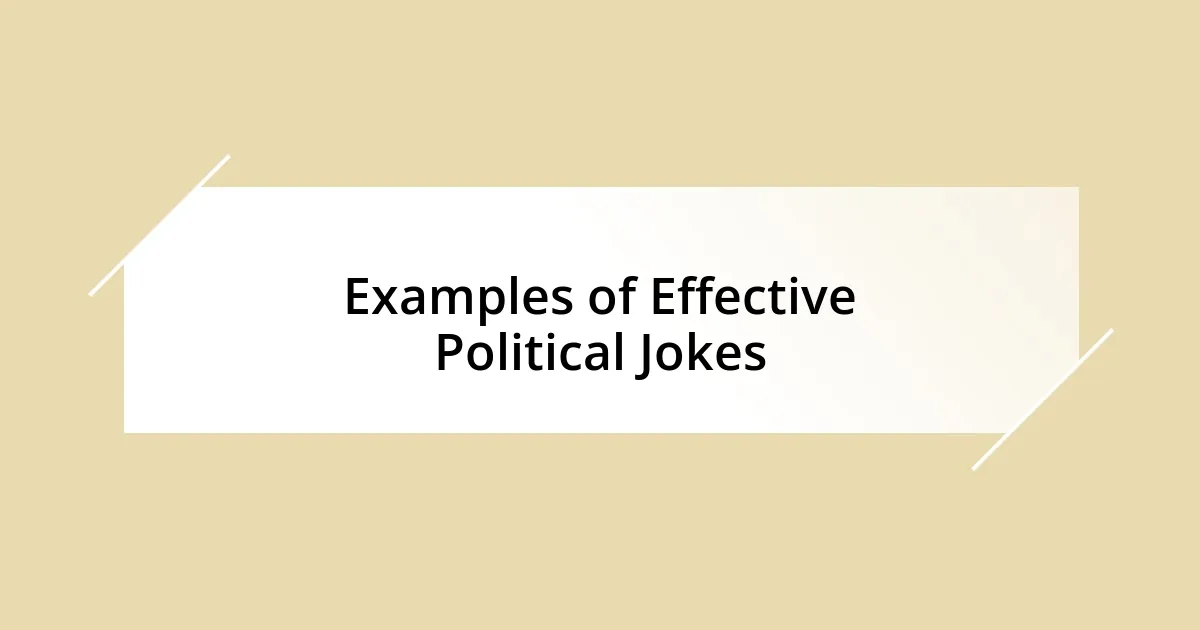
Examples of Effective Political Jokes
One classic example of an effective political joke I encountered recently was a play on words that poked fun at the housing crisis. A comedian quipped, “Buy land; they’re not making it anymore, unless you’re a politician!” This joke struck a chord with many of us in the audience, evoking laughter while also shedding light on how politicians sometimes prioritize development over genuine community needs. It’s fascinating how a simple twist of phrase can encapsulate such a complex issue, isn’t it?
Another memorable moment came when I was watching a late-night show and the host did a segment on campaign promises. He said, “If you can’t convince them, confuse them!” It not only drew a hearty laugh, but it also led me to reflect on how often this rings true in political discourse. This kind of humor highlights the irony of political strategies and deftly underscores the overwhelming nature of election cycles.
Then there’s the painfully relatable one-liner I heard during a small gathering: “I don’t always vote, but when I do, I make absolutely sure it’s for the option I dislike the least!” The room erupted in laughter because this sentiment resonates with many who’ve felt disillusioned by their choices. It’s interesting how humor can not only entertain but also validate our frustrations in the political landscape. Why do you think we find solace in jokes like these? Perhaps it’s because they remind us we’re all in this messy political game together.
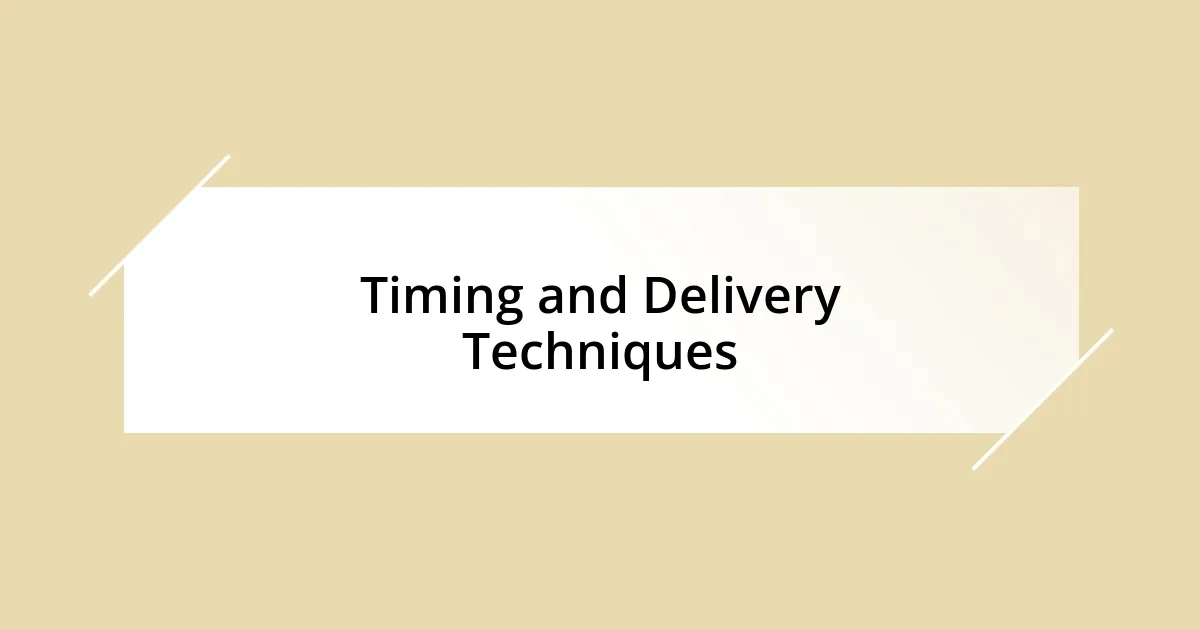
Timing and Delivery Techniques
Timing in political jokes is everything. I remember watching a stand-up routine where the comedian paused just before the punchline. That suspense built an energy in the room, making the laughter that followed feel even more explosive. It was a tactical choice that created a shared moment of anticipation, and I find that using pauses effectively can really amplify the humor in political commentary.
Delivery techniques also play a critical role; it’s not just what you say but how you say it. One evening, during a casual dinner with friends, I shared a satirical take on a trending political issue. I chose a casual, conversational tone, mimicking the way people often discuss politics over meals. The relaxed atmosphere, paired with a laid-back delivery, allowed everyone to engage and laugh together. Humor thrives in spaces where people feel comfortable, bringing them together over shared frustrations.
Consider the rhythm of your words as well. When I’ve shared a deliberate back-and-forth exchange mimicking a political debate, the audience stays engaged, laughing as they recognize the absurdity in the format. It’s almost like a dance; you lead with your voice, and the audience follows, responding to your cues. Are you ready to experiment with different techniques in your own humor? You might find that varying your pace and energy can transform a simple joke into a memorable punchline.
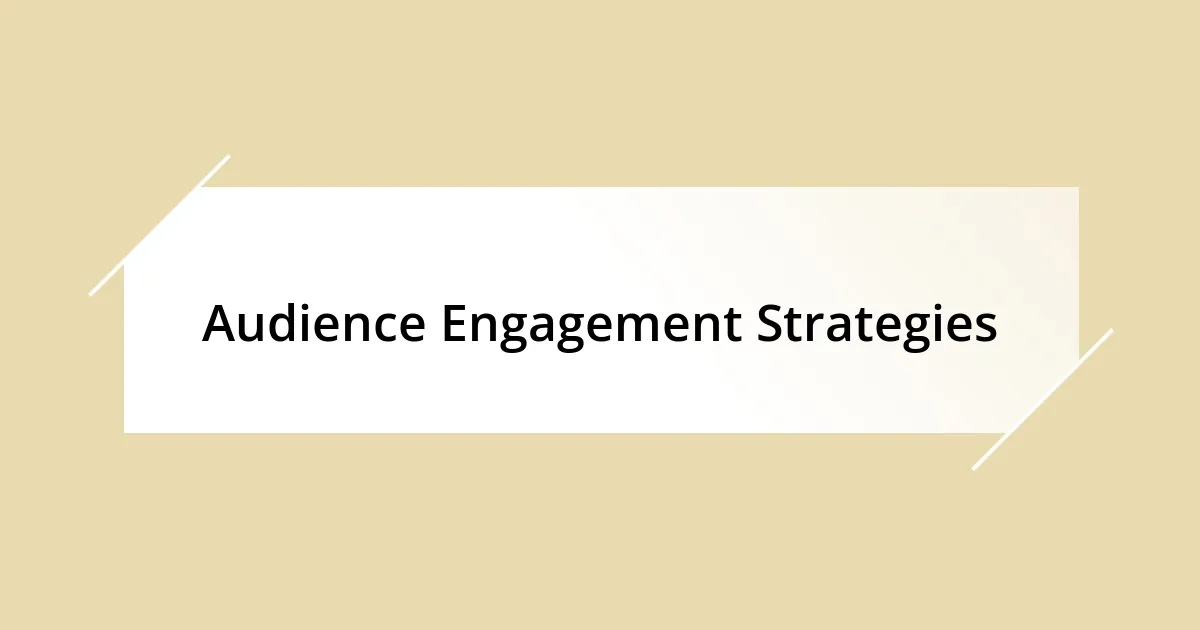
Audience Engagement Strategies
When it comes to engaging an audience, I’ve found that eliciting shared experiences can be a game-changer. For instance, during a community event, I decided to dig into local political issues that we all felt passionate about. By opening with a joke about a particularly baffling town hall meeting, I saw the smiles blossom on faces across the room. It created an instant connection, turning nervous laughter into an atmosphere of camaraderie. Have you ever noticed how shared jovial moments can transform the dynamics of an audience?
Creating relatable scenarios also enhances engagement. I remember once at a family gathering when I joked about a politician’s awkward attempt at public speaking. As soon as I mimicked his stilted delivery, the room erupted. It was as if everyone had collectively recalled that same cringe-worthy moment—my light-hearted impersonation became a bridge that united our laughter. Isn’t it fascinating how humor can encapsulate a feeling that’s often awkward or uncomfortable?
Additionally, I’ve appreciated the power of including the audience in a playful way. At a friend’s party, I asked everyone to shout out their most ridiculous campaign slogans. The ensuing banter sparked laughter as we built on each other’s ideas. By inviting others to participate, it shifted the joke-making process from a one-way street to a community effort. It made me wonder, how often do we consciously involve our audience in humor? When they feel like active participants, their investment in the joke—and the overall experience—heightens significantly.
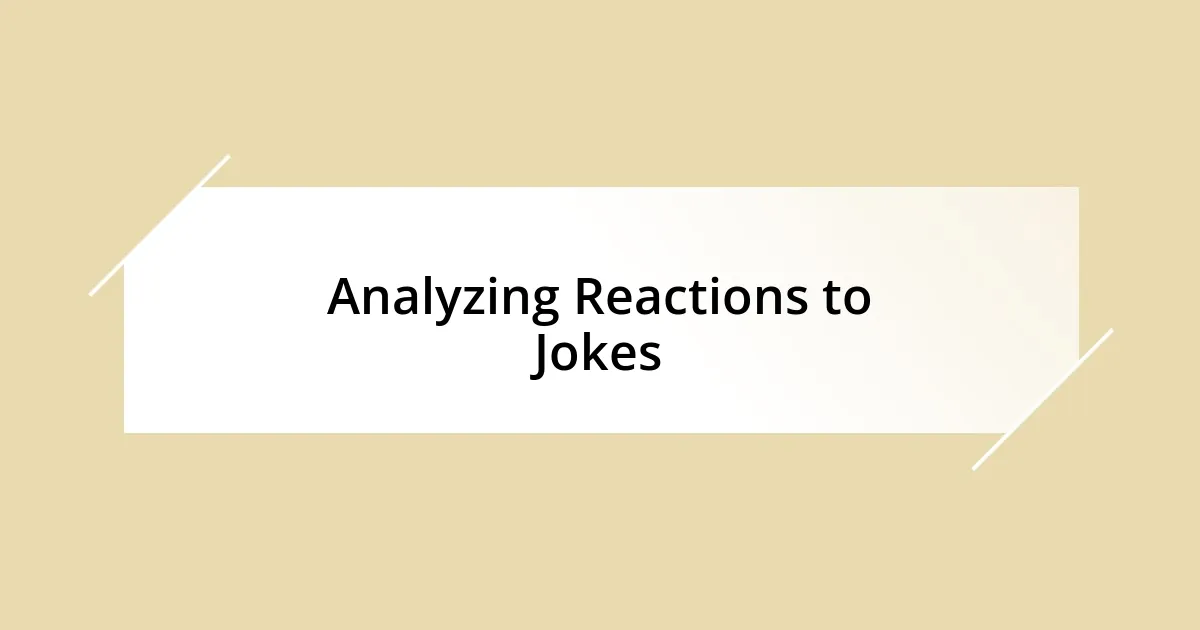
Analyzing Reactions to Jokes
Analyzing how audiences react to jokes is a nuanced process that requires observation and understanding. I recall a time at a political rally when I made a quip about a candidate’s infamous blunder. The room buzzed with laughter, but I noticed that some people hesitated, unsure whether to join in. Their thoughtful reactions made me realize that not every joke lands the same way with everybody. It’s intriguing to think about how personal beliefs shape our responses to humor. Have you ever felt torn between laughing and staying serious?
The context also matters immensely. I found that sharing jokes during less tense moments—like a laid-back brunch—invites warmer reactions than during heated debates. One morning, I dropped a lighthearted jab about a politician trying to connect with young voters, and the chuckles echoed pleasantly through the room. The relaxed atmosphere allowed everyone to let their guards down for a moment. Isn’t it amazing how the setting can shift the entire tone of the joke?
I’ve also learned to adapt based on immediate feedback. While performing at a local open mic, I noticed how my audience reacted to a line about bureaucracy’s inefficiency. The initial chuckles quickly turned into uproarious laughter, igniting a contagious energy that made me feel like I was tapping into a shared frustration. That moment taught me about the importance of reading the audience—do you pay attention to their cues? Understanding these reactions shapes my approach to crafting jokes, creating a cycle of humor that resonates deeply.
